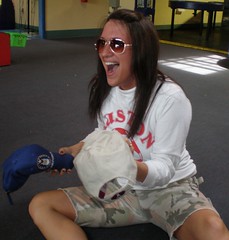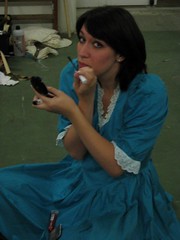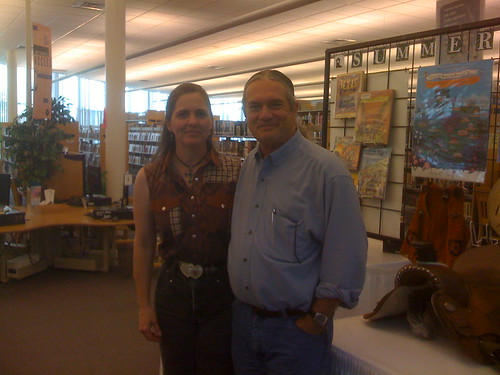Laura Elisabeth Ulrich is one of the brightest and most talented women I’ve ever encountered. We first met in my English class at ULM, and I was impressed with her writing, and later after hearing her sing, with her voice. She is passionate, loyal to her friends and family, and an achiever by nature. She is the paid soloist for the First United Methodist Church in our area, teaches voice and theatre, composes music, designs websites, has been the hired soloist for funerals, weddings and other social events, has been the paid soloist for several sports events and conventions, including the Republican National Convention. Laura graciously consented to this interview for my blog.
1. QUESTION: Give me a grief summary of your musical life.
ANSWER: I began scat singing “Lullaby of Birdland” before I could speak… I grew up singing jazz and from there I went on to do musical theatre until I got into college. Once in college, I received my first vocal lessons and switched over to Opera. My professor’s teaching belief was if I could learn the basics of Opera and do well in that, then I could do anything. I’d say she was right.
2. QUESTION: Laura, when and how did your love for music develop?
ANSWER: Honestly, I had no die-hard love for music growing up. I liked jazz, rock, heavy metal, and soundtracks. Actually, I typically despise listening to others sing. I’m FAR too critical. I hate listening to myself sing. What I fell in love with was the interpretation of music: the thousands of different ways that you can get across an idea, emotion, or belief through music. It can be instrumental, vocal, or even silence. Victor Hugo states it well, “Music expresses that which cannot be put into words and cannot remain silent.” Whether I’m listening to music or writing it, that is the point in which I search for.
3. QUESTION: What is your favorite genre (do they use that word in music world?) of music? Any particular favorite performers and songs?
Ooooh… genre… mmm… Rock. I have a severe love for Pink Floyd. I also like instrumental music – anything by Hans Zimmer or Jeremy Soule is incredible. Favorite songs? “When the Levee Breaks” by Led Zeppelin, “Fearless” and “Brain Damage” by Pink Floyd, and a remake of “All Along the Watchtower” by Bear McCreary.
4. QUESTION: You’ve traveled a good bit with your music. Tell my readers about some of your travels.
ANSWER: When I was younger, I sang with Masterworks Children’s Choir. We traveled to New York and D.C. After that, I didn’t travel with music until I got into college. In 2006, I performed in Austria for the 250th Anniversary of Mozart’s death, and went on to perform in Italy in 2007 in “The Marriage of Figaro.” I went over as an understudy and took the role of Cherubino over from the Italian woman they had originally cast. This past summer, I sang at the Republican National Convention several several times (with my first performance being on National television after not sleeping for three days and JUST arriving from the airport). During the summers, I travel across the state teaching music and acting with CA Studios (such as teaching kids to sing a rendition “Row, row, row your boat” in three part harmony with the Beatles’ “Come Together” as accompaniment), and now I am performing in Bastrop, La at the Rose Theatre as Lucy in their production of “Jekyll and Hyde.”
5. QUESTION: Do you play any instruments?
ANSWER: Heh… I can barely read music. I grew up learning things entirely by ear. If I can hear something once or twice, then I can perform it. I didn’t even attempt to read music until college, and… it still kicks my butt. Thus, I never tried to pick up an instrument. I can play piano enough to barely pass a piano proficiency exam (because I was required to in my degree lol!). However, I -did- just pick up a bass over Christmas and can now play through all of Pink Floyd’s “Dark Side of the Moon” album… I’m trying!!
6. QUESTION: What are your future musical plans?
ANSWER: Future? I have no idea. I’ve decided that I enjoy music far more as a hobby than as a profession. I enjoy theatre. I enjoy opera. I enjoy writing instrumental music. I’d love to one day have my stuff performed by Monroe Symphony… maybe it’ll happen. Either way, I’m doing what I’ve always done – I take the opportunities as they come. If something happens, AWESOME! If not, I’ll try again later. My foremost goal is to discover my niche in the music world. I can sing opera. I can sing musical theatre. I can sing jazz. I can sing rock. I can write the music. I can tear it apart and understand it. I really have a knack for hearing and writing harmony that isn’t typically there. But I can’t figure out what I prefer or which I enjoy the most. So my quest for now is to figure out exactly where and how my passion for music lies.
7. QUESTION: What advice would you give young singers?
ANSWER: Never let -anyone- tell you that you can’t do something. Can’t never could. You only fail when you have failed to try. I can’t count the hundreds of times that people have told me that I couldn’t do something and I’ve (luckily) been able to proven them wrong. Even now, with “Jekyll and Hyde” – My entire college career, I was told that you can’t perform both opera and musical theatre (that’s why I switched to opera rather than remaining with musical theatre). Yet in this show, I’m singing all the operatic first soprano chorus lines that lie in the stratosphere of high C’s, yet my actual character is an alto belter role. I was told I’d never make it into the Rome Opera Festival, that I’d never win competitions because I was a freshman, that I’d never win another competition because I won the previous year, that I’d never get the leading role in three consecutive shows in one season, etc. If someone tells you that you can’t do something, take that as an opportunity to prove them wrong! Never ever ever give up. It takes hard work. It takes blood, sweat, and tears. But in the end, it’s a mental game. If you believe to your core that you can do something, then nothing will stop you from doing your absolute best. Again, you only fail when you have failed to try.
Here is a list of Laura’s performances:
Performance Credits
Title of Production Role Played Backstage Work Year Venue
Hilarious History Betsy Ross 1995 Oxford University School
Pinnochio The Blue Fairy 1996 Young Troupe
Annie Warbucks Annie 1996 Strauss Theatre Center
Boogie on the Bayou Woodpecker 1996 Young Troupe
Southern Angst Narrator 1997 Young Troupe
Ramona Quimby: Age 8 Susan 1997 Young Troupe
Junkyard Dogs Skeeter 1997 Young Troupe
Return to the Forbidden Planet Chorus 1998 Young Troupe
The Hobbit Set Design 1998 Young Troupe
Sound of Music Louisa 1998 Strauss Theatre Center
I Sincerely Doubt That This Old House is Haunted Spotlight 1998 Strauss Theatre Center
Wait Until Dark Gloria 1999 Strauss Theatre Center
High Society Chorus 2000 Strauss Theatre Center
Sleeping Beauty Princess Narcissus 2000 Young Troupe
Wizard of Oz Ozian 2000 Young Troupe
Julius Caesar Various Costuming 2000 Neville High School
Cottonland Christmas Unwrapped Various 2000 Strauss Theatre Center
Canterbury Tales 2001 Neville High School
A Midsummer Night’s Dream Assistant Director/Music 2002 Young Troupe
Schoolhouse Rock Dori 2003 Young Troupe
The Lion, The Witch, and The Wardrobe The White Witch 2003 Young Troupe
Romeo and Juliet Juliet Music 2003 Young Troupe
Deathtrap Backstage Crew 2003 Strauss Theatre Center
Cottonland Christmas Unwrapped Various 2004 Strauss Theatre Center
The Best Little Whorehouse in Texas Linda Lou 2004 Strauss Theatre Center
Les Miserables (2x) Fantine 2004 Young Troupe
Annie Grace Costuming 2004 Strauss Theatre Center
Divorce Southern Style Elizabeth Costuming 2005 Strauss Theatre Center
Route 66 Backstage Crew 2005 Strauss Theatre Center
Opera Workshop Various 2006 Louisiana Tech University
The Marriage of Figaro Cherubino 2007 Rome Opera Festival
The Comedy of Errors Antipholus of Syracuse 2008 Dixie Theatre Center
Jubee Revue Various Assistant Director/Music 2008 Rayville Arts Center
Jekyll and Hyde Lucy 2009 Rose Theatre
In addition to these, there are numerous summer workshops where Laura taught, performed, and assistant directed.
Here are some photos of the beautiful singer. The last photo is of her in Figaro:

Laura








